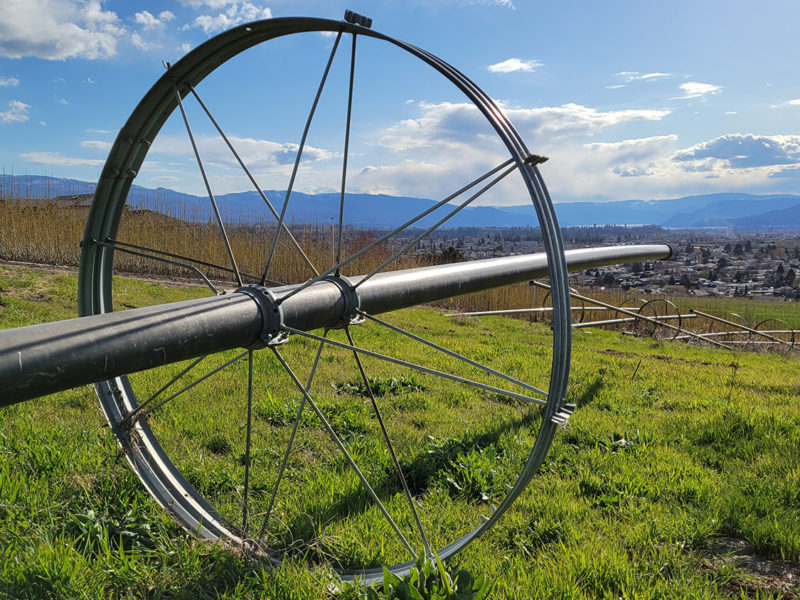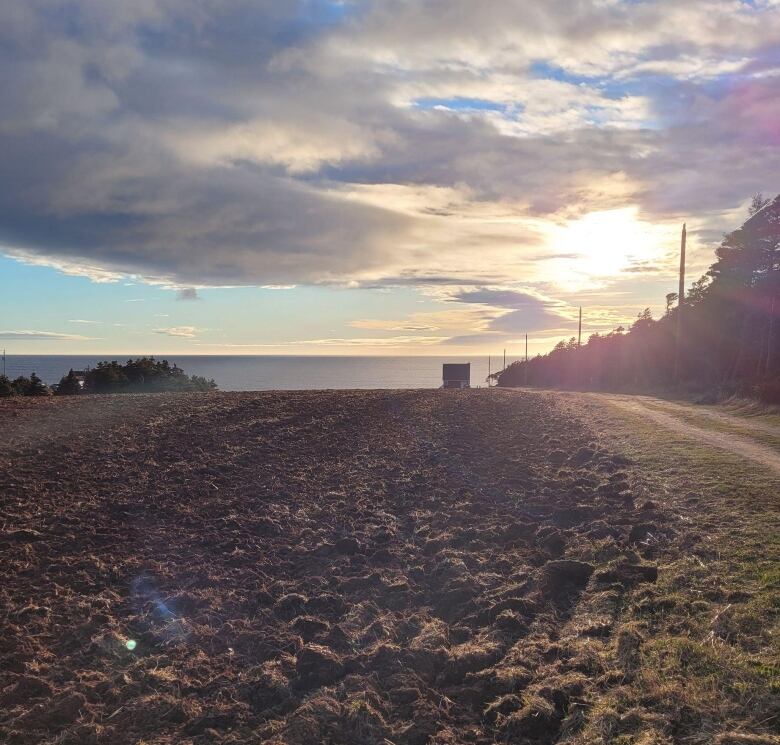https://www.youtube.com/watch?v=A_NJ1h6VfFM&ab_channel=TruckMaster
Furnace oil increase pushes price to $2.84 per litre
The maximum price for diesel including delivery jumped up 68.6 cents to come in at 307.3 cents a litre.
Meanwhile, maximum furnace oil prices with delivery went up 67.2 cents to 284.6 cents a litre.
The overnight increase brings both fuels to their highest prices since at least 2006 when the Energy and Utilities board started regulating fuel prices.
Generally fuel prices are reset every Wednesday at midnight. But the prices can be changed, either higher or lower, at any time if the benchmark price changes by more than six cents in one day.
Farmers hurting
The price increase spells trouble for industries that rely on diesel, like farming.
David Coburn of Coburn Farms said the impact will be immediate.
"We just started our grain corn harvest this year for the season and it's approximately going to be an extra $1,000 a day on harvesting our corn crop," he said.
"With all the trucks and tractors and combines that were running, it's going to be a major hit."
Mark Smith of Springhill Farms said the increase will be felt now. But it will be worse if it continues into next spring and summer "when we start using the tractors more."
A trend?
The increase in diesel and heating oil isn't just impacting New Brunswickers.
In Nova Scotia, the price of diesel rose by 15 cents overnight to 248.7 cents.
Meanwhile in Newfoundland and Labrador, prices for diesel jumped by 27 cents for most of the province while heating oil in parts of Labrador went up by 30.92 cents.
There was an increase of nine cents a litre on both fuels on Prince Edward Island.
With files from Aniekan Etuhube
CBC's Journalistic Standards and Practices
https://www.facebook.com/Kealy-Farm-370334516504214/

BC agriculture shrinks

BC reported fewer farms in last year’s census of agriculture, with losses outpacing the national average.
The province was home to 15,481 farms last year, a decline of 10% since the last census in 2016. This follows an 11% decline in 2016 versus 2011, and contrasts with a 2% increase in neighbouring Alberta. Nationally, the number of farms fell by 2%.
The losses were shared by large and small farms alike, with farms between 1,600 and 2,240 acres alone in showing growth. All other categories saw numbers decline, led by farms larger than 2,240 acres, which collectively saw their numbers fall 24% to 363.
With respect to specific sectors, contained environment agriculture (CEA) reported the greatest gains followed by the grain, poultry and sheep sectors.
The census shows that producers of non-greenhouse crops grown under cover other than mushrooms increased 79% to 325. Grain growers increased 38% to 419, led by corn growers (up 184% to 71) and wheat (up 38% to 69). Sheep farmers now number 490, a 21% increase from 2016.
Small farms continue to dominate in the province. Operations smaller than 70 acres account for 66% of BC farms. The majority of small farms are located in the Lower Mainland, the Thompson-Okanagan and Vancouver Island.
Direct sales are a popular route to market for many small producers, and 78% of the 5,381 farms in BC that engage in direct sales are located in the same three regions where small farms dominate – the Thompson-Okanagan (28%), Vancouver Island and the Lower Mainland (25% each). The census indicates that 46% of BC farms receive all their income from direct sales, with the two key channels being on-farm retail locations or consumer deliveries.
But more than half of BC farm operators, or 53%, also have off-farm jobs. Many farm part-time, with 43% saying they spend fewer than 20 hours doing farm work. But 38% also work more than 30 hours each week producing food and other farm products.
BC’s farming population is also the oldest in Western Canada at 58 years, on par with Nova Scotia. While the large number of retirees taking up farming as a second career or part-time pursuit is one explanation, census figures also indicate that – unlike Manitoba and Alberta – BC has been unable to grow or even retain younger farmers. While farmers younger than 35 increased by 13% in the last census, numbers fell 34% between 2016 and 2021 – a rate of decline faster than any other province outside of Atlantic Canada.
BC continues to lead the country in the proportion of farm operators identifying as female. Women make up 40% of farm operators, up from 38% five years ago.
https://www.cbc.ca/news/canada/newfoundland-labrador/opinion-bruce-young-farmer-1.6466510
I'm a young, passionate farmer, and it seems the system is designed for me to fail
Governments say they support local farmers. The evidence tells me something different
This column is an opinion by Chris Bruce, a farmer in western Newfoundland's Codroy Valley. For more information about CBC's Opinion section, please see the FAQ.
With soaring costs of fuel, feed and fertilizer, there is no doubt that farmers in Newfoundland and Labrador are having a hard time, and the government should do whatever possible to keep farms in the province afloat.
We simply cannot afford to have any more farms close.
However, when we look at the plight of large industrial farms in the province, it has to be understood that this crisis was predictable.
There is a notion that farms pull plants from the ground, or keep animals on that land, and bring them to the market.
This was once true, and inputs to that farm were minimal. Now, however, that picture isn't quite the same.
On the largest farms in the province — which still remain relatively small, compared to the rest of the country — inputs include pesticides, fungicides, fertilizer, seed and lime. It all requires massive pieces of equipment. None of these mega-tractors are built in the province of course, and their repair and maintenance requires access to a supply chain that likely spans several continents.
I cannot begin to express how little our province cares about small farms.
Some feed inputs come from the province in the form of grains, corn, and fish offal. The rest comes from either away, or far away.
Local wholesalers, mechanics and retailers do great around farms. The majority of the annual spring investments go to big companies that have little to nothing to do with Newfoundland.
Even the biggest farms are over a barrel from bigger companies. And this is how it's supposed to be.
Wait. This is how it's meant to be?
As a small farmer (from a long line of traditional farmers in the Codroy Valley), much of this seems like madness to me.
Crop rotation isn't mandatory and has been exchanged for a suite of field treatments of fertilizers and various bug and plant poisons to prolong activity.
 A truck hauling kelp onto a shared family plot, 'almost like Grandpa used to do,' Chris Bruce says. (Submitted by Chris Bruce)
A truck hauling kelp onto a shared family plot, 'almost like Grandpa used to do,' Chris Bruce says. (Submitted by Chris Bruce)
But let's say the big guy does his thing. Surely small food producers are just as valued, and allowed to engage in the market?
I cannot begin to express how little our province cares about small farms.
There are many, many examples of small-scale food producers being ignored or having their commerce outright criminalized. That may sound alarmist, but this is the nature of how our province has enforced the quota system.
Let's say you want to raise chickens on a medium-sized plot of land.
You might think, "Hey, Newfoundlanders are the chicken-wing-eatingest province in the country, I should raise chickens." You would be allowed to, but you'd only ever be allowed to have 99 without disrupting the quota system.
There is a single player on our market, Country Ribbon, and it's not owned by Newfoundland farmers but an ag company out of Nova Scotia. They are who you have to ask if you want to raise more than 99 chickens, and they, uh… they won't say yes.
It may sound bogus, but yes, a private company from Nova Scotia gets to decide who else enters the market they have full control over. And they have figuratively received buckets of cash from our government.
A chicken or egg scenario
Let's say you live it up and raise your 99 chickens, and somehow manage to sell them at $25 a bird (good for you). You've made $2,475 before expenses. You also… can't slaughter it yourself. Or even pay to have someone come to your land and do it, even if you're doing one a day under the most sterile conditions. It doesn't matter, no on-farm slaughter.
But don't worry, the province says it supports small farmers.
OK, so you lost your shirt in the chicken meat market. So you say eggs! Everyone eats breakfast.
 Getting
into the egg business is far from easy, Chris Bruce argues, because of
restrictions that limit what small farmers are allowed to sell. (Caitlin Taylor/CBC)
Getting
into the egg business is far from easy, Chris Bruce argues, because of
restrictions that limit what small farmers are allowed to sell. (Caitlin Taylor/CBC)
It's still a low number, and the eggs are ironically not all in one basket (multiple egg entities exist), but even 99 healthy layers means you'll have hundreds of eggs a week. Such a good problem! That's enough eggs to justify scaling up a little and cutting a deal with a local corner store.
But. You. Can't.
Well, you could … but you'd need to go through an industrial amount of extra work in order to comply with food standards set for factory-farmed eggs. Your meagre profits would be dashed, and the wishbone would come up short.
Small egg farms are prohibited from selling anywhere other than a local farmers' market or what's called the farmer's gate. This means your eggs could be sold from the farm, or you can bring the eggs two towns over to a farmers' market and sell out, but the locally owned corner store would be fined if they sell them.
And our food enforcement folks are willing to enforce these laws.
There are things we can do
The net of food laws we have made is tangly and, frankly, quite sad. Top to bottom, our governments and industry have more or less set things up this way.
Quota holders are routinely recipients of massive government subsidies, along with their truly unheard of market control on production and price. Agricultural colleges and lobbying firms are tied in deeply to conventional chemical agriculture, and provincial and federal governments have funded it for years.
 The sun sets on Bruce family land overlooking the Gulf of St. Lawrence. (Submitted by Chris Bruce )
The sun sets on Bruce family land overlooking the Gulf of St. Lawrence. (Submitted by Chris Bruce )
Farms are becoming fewer and larger, and increasingly foreign owned.
I don't want anyone to lose their farm. I also don't want us to keep funding a system that never really made sense.
As a small farmer who has been told "no" by the province while asking to raise food, because I asked for too many chickens once upon a time, I can tell you we have much bigger problems than the price of fuel.
The province could do a lot without spending any more money (though… they should spend more money on farmers).
Open up the bottom end of the quota system to allow for small farms to operate. Mandate crop rotation. Get cows and chickens out of barns for their entire lives.
Support mixed production farms that don't waste the nutrients of the soil. Let corner stores function as farmers' markets. Stop wasting small farmers' time and energy with red tape.
Do it for the bees, or something.
We needed to act 10 years ago, so we may as well act now.

No comments:
Post a Comment